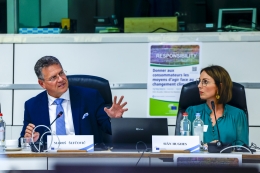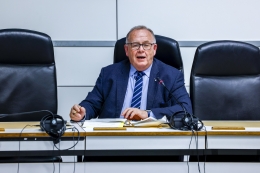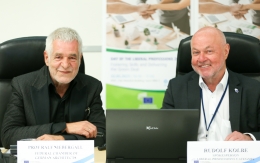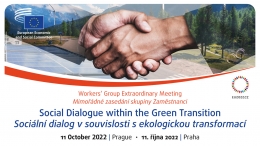European Economic
and Social Committee
Európska zelená dohoda
Európska komisia spustila 11. decembra 2019 Európsku zelenú dohodu, ktorou sa posilňuje záväzok EÚ riešiť klimatické a environmentálne výzvy, čo je hlavnou úlohou tejto generácie. Cieľom Európskej zelenej dohody je premeniť EÚ na moderné a konkurencieschopné hospodárstvo efektívne využívajúce zdroje, čím sa zabezpečí, že:
- do roku 2050 dosiahneme nulové čisté emisie skleníkových plynov,
- hospodársky rast nebude závisieť od využívania zdrojov
- a na žiadneho jednotlivca ani región sa nezabudne.
V záujme realizácie Európskej zelenej dohody vypracovala EÚ komplexný balík iniciatív, ktorý zahŕňa politické a legislatívne návrhy, ako aj rozvoj a modernizáciu finančných nástrojov.
EHSV vyzýva na vytvorenie „Zelenej a sociálnej dohody“, pričom zdôrazňuje úzku spätosť medzi Zelenou dohodou a sociálnou spravodlivosťou. Je nevyhnutné vypočuť názory všetkých zainteresovaných strán s cieľom podporiť udržateľné a konkurencieschopné podniky zajtrajška v zdravom prostredí.
V Európskej zelenej dohode sa kladie veľký dôraz na investície a financovanie zelenej a udržateľnej transformácie. Zelená dohoda je životne dôležité pre to, aby sa Európa pozviechala z pandémie COVID-19. Vynakladá sa na ňu jedna tretina z investícií vo výške 1,8 bilióna EUR z plánu obnovy NextGenerationEU a zo sedemročného rozpočtu EÚ. Toto zvýšenie finančných prostriedkov má pomôcť premeniť krízu na transformačnú príležitosť pre budúcnosť Európy.
EHSV zohráva kľúčovú úlohu pri monitorovaní realizácie iniciatív a opatrení Európskej zelenej dohody. EHSV pripravuje stanoviská a organizuje aktivity (pozri menu na ľavej strane tejto stránky) s cieľom zabezpečiť, aby inštitúcie EÚ zohľadňovali názory organizovanej občianskej spoločnosti a aby iniciatívy v rámci Zelenej dohody boli v súlade s hospodárskou, sociálnou a občianskou realitou v danej oblasti.
Keďže Európska zelená dohoda je problematikou, ktorá má prierezový a komplexný charakter, zameriavajú sa na ňu všetky sekcie EHSV, ako aj CCMI.





